An Interview with Space Artist Astronaut Alan Bean
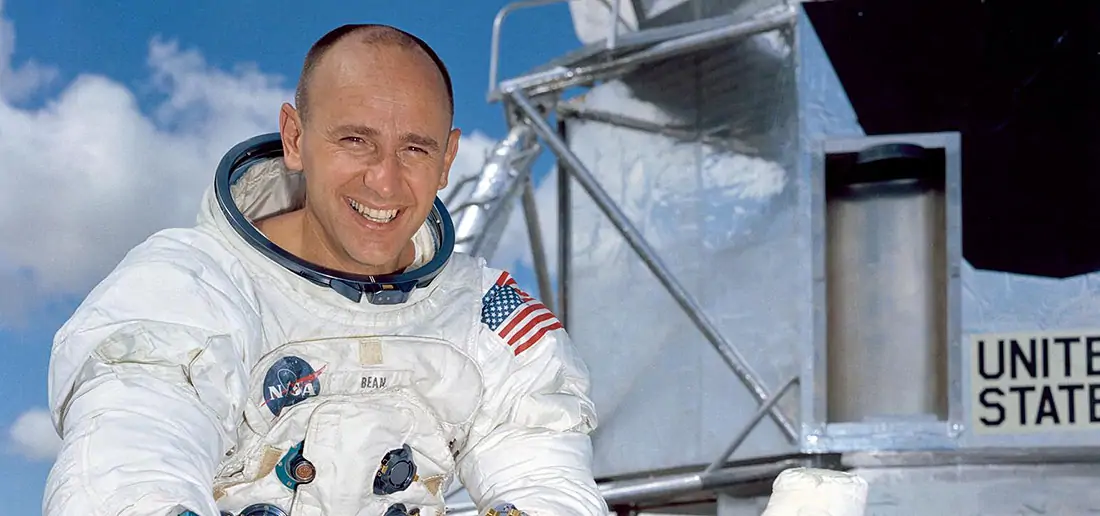
Hanging on the wall over my desk is a print by space artist and Apollo astronaut Alan Bean. Titled Too Beautiful To Have Happened By Accident the title is taken from a quote by Apollo 17 astronaut Eugene Cernan who said "When I stood on the moon and looked up at the Earth, I felt it was just too beautiful to have happened by accident. I could see all the elements that made up Apollo -- the moon, the planet and country from which the first explorers came, deep infinite space, and man himself."
On October 3, 1992 I had the opportunity to interview Alan Bean, Apollo 12 Lunar Module Pilot, 4th man to walk on the Moon, Commander of the 1973 Skylab 2 mission, and renowned space artist. Following is a transcript of our conversation.
JP: Approximately how many paintings have you done?
Alan Bean: About 70.
JP: Over what kind of time-span?
Alan Bean: We're talking now space paintings, about 9 years.
JP: All the paintings I've seen by you are of your experiences on the Moon. Have you done any that relate to your Skylab experiences?
Alan Bean: No, I haven't. I plan to do some about Skylab. In fact I had planned when I began all this back in 1981, when I left NASA to do the job of recording the adventures that I had and other astronauts had in space, doing all these different programs, particularly Skylab and Apollo. But I found that being an artist and doing accurate work is very difficult. It's difficult to jump around between different kinds of spacesuits, different kinds of hardware, and other things, and make them accurate and make them beautiful. So I've been concentrating my efforts at least for the past number of years on Apollo.
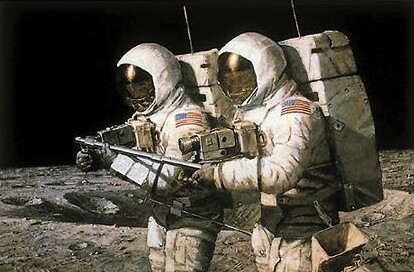
JP: Is there some particular aspect of your astronaut training that you feel most helped your artistic abilities?
Alan Bean: Well, that's a good question. No, and I'll tell you why there isn't. When you are flying spaceships, its completely different from drawing them and painting them because when you are flying them, you are interested in how they work.
For example, the radar antenna on top of the lunar module. I ran the radar antenna from the inside. I had dials and controls and circuit breakers. I had to know which way to point it; what would happen if a motor failed; how I would get to alternate motors; what to do if a circuit breaker popped; where to put it at certain times; how to keep it cool; a lot of other things like that. I didn't even care what it looked like. I just knew what it did. I recognized it when I saw it and I knew where it was. The whole thing I did with the antenna was completely different.
When I became an artist, then I wasn't interested in any of that stuff anymore. I was interested in how big was it relative to the hatch, or something else that was in the painting. What angle is it sitting at relative to the horizon at that position in flight? How does it look when part of it is shadowed and part of it is in Sun? How does something that's circular look when it's not facing you directly and is an ellipse? So there were all these different things.
The thing that I bring to it is sort of like when I'm doing a spacesuit. I know when all the parts are painted in there. I may have had to learn how each of them look specifically, but I will know where they are and what they are, and I see so many space painting that are just inaccurate because the person didn't spend a number of years knowing this. I know what each of these connectors is, what color it should be, where the lever is, how it is, and I see them positioned wrong frequently.
What I see mostly in other space paintings is they will mix flight hardware and suits with training hardware and suits. So here is a person on the Moon and they are wearing flight boots and the backpack is a training backpack that we would never take to the Moon. So it's kind of a "most people don't care" and that's what I bring to the artistic end of it - is that the things that I do finish are as good as they technically can be, I think just because I spent 18 years learning that technology.
I have a friend of mine that's a rancher at the University of Texas and I had been pointing out this horse painting to several people. I thought it was a very good horse painting. I liked the colors and everything. He saw it, he's a rancher, he says "The horse is to long". I looked at it again and you're right, the horse was to long. You know, I had never seen it in all that time of looking at it. I just noticed the colors and the light. To me, it was wonderful, but to him, it wasn't a good painting because the horse wasn't right. So, I can tell when the horse is right because I spent 18 years on, not horses, but spaceships and spacesuits.
JP: I've seen many books where your paintings have been used to illustrate the book, and I've seen your paintings in books that were collections of space art. What plans do you have, if any, of putting out a book exclusively of your art?
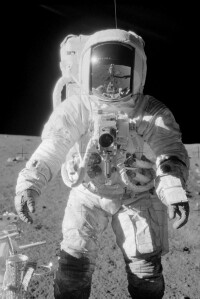
Alan Bean: Well, I had a wonderful plan to try to do it by the 25 anniversary [of Apollo 12] which comes up in 1994. I thought this would be a wonderful window of opportunity. There would be a lot of interest. Then when I looked into it, I realized that to do the book - to get the people to do it - to work on that project would take more months than I wanted to take away from doing the paintings. My concern is that I won't live long enough to do the paintings that I should do. You never know, I'm 60 years old. You never know when you're going to die. I may live another 20 years, I may never live another week. I thought a lot about it and decided that in the long run it was more important for me to try to create the paintings than it was to try to mass them together and put them in a book. If I could make a book show up tomorrow, I would do it, but I just can't at the moment take time away. Maybe, five years from now when I've got more paintings done and I feel like that job is more complete, which I don't feel it is now. I feel like there's to many paintings left unpainted that I just don't want to take the time away.
JP: When you returned to Earth from your Apollo 12 mission, did you imagine that the space program would turn out as it has turned out - ending with Apollo 17 and no more missions to the Moon?
Alan Bean: No. In fact when we came back, we thought there was going to be 20 flights - it had already been reduced to 20 - and I actually thought that I might get a chance to go back to the Moon, maybe on Apollo 20 or 19, or something like that because when you get in this rotation, you know like we flew on 12, we'd be the backup for 15, and we would maybe fly 18 or 19, it depends. But, I thought maybe I would get to go back again and then they stopped it after 17. So, I was kind of in that rotation. That's what put me in position to fly Skylab. So it worked out fine, but I never imagined that we would stop and I would have to say that all of us at NASA felt that the program would go on much stronger than it actually did. But then in hindsight now, I don't think we should have thought that. We could have seen that it cost a lot of money and it was repetitive from many people's points of view, certainly the Congress and many of the news media. We should have seen then that this will not work that way. We're going to have to come up with a new act. You know, what have you done for me lately? You've been going to the Moon a bunch of times and you keep bringing back rocks, what's new? So that's a real world situation. And someday people will tire a little bit of the space station and they'll say let's quit going to the space station and go to Mars, or go back to the Moon. So its just the way human history works.
JP: Given our culture and political environment today, what do you think the chances are for the successful implementation of the space station as well as President Bush's Mission From Planet Earth? Do you think those are realistic for the near future?
Alan Bean: Yes I do. I think everything depends on money. How much money does the administration want to put forth to do this kind of exploration. And I think the amount we're getting now is about what we're going to get in the future. I don't see that changing very much and so I think we'll take that money and use it to build a space station. Then we'll use it to make it a little better and then when money frees up of that amount, then we'll try to decide what we can do with that money then.
I don't think we're going to see a sudden jump in the budget other than inflation. It will keep going with inflation. So I don't see anything for a while. It's going to be an orderly movement and that's okay. That's the way history is. History has spurts and then is steady, and then maybe even backing up a step, and then forward again. It's not going to change now. Look at how long it was between when Columbus discovered here and the Pilgrims came. 1492 to 1640's - a couple hundred years. That's just the way the world is, so I don't feel the least discouraged. I think that's just how it is. People will ask me frequently "Are you discouraged by the lack of money or something for the space program?" I say no, that's it, that's the way it is. That's the way humans do.
But something will happen, I don't know what it is that will finally encourage people to band together with other countries and go to Mars. I used to think, incidentally, it would happen in my lifetime. I don't think it will anymore, but I used to think I would see it, but now I don't think so. I think my kids will see it but who knows.
JP: Do you have any closing comments or thoughts for our readers?
Alan Bean: Nothing other than the movement of human beings off the planet out into the Universe; first the Moon, and then Mars, and then who knows where; is just beginning and there is nothing that can stop it. None of us know the timetable, none of us know whether it's going to happen rapidly or it's going to happen very slowly.
Eventually, as the centuries unfold, human beings will populate all these places and maybe a thousand years from now, or maybe it's two thousand or five thousand, there will be more human beings living off the Earth than live on it. Its just going to happen and we don't need to be anxious about it. We don't need to worry that next year they decide to cut the space station. If they cut the space station next year, I hope they don't, but if they did, it's not the end of the world. We're going to eventually have a wonderful space station. Eventually there are going to be cities in space. If Chicago had been founded a hundred years later, we wouldn't even know that now. I don't know when it was founded, but if it had been a hundred years later or a hundred years earlier, right now it wouldn't make any difference. It would probably look about the same. People would be just as happy doing the same things. That's the same way with space exploration. Maybe we don't go to Mars in my lifetime, maybe we don't even go till my grandkids lifetime. That's okay. Eventually it will happen.
JP: Thank you Alan.
Books by Alan Bean
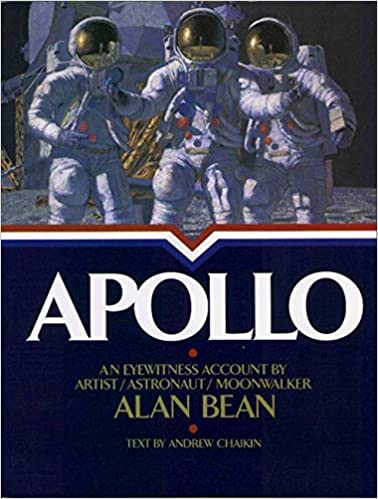
Apollo: An Eyewitness Account By Astronaut/Explorer Artist/Moonwalker
Published:1998
Publisher:Greenwich Workshop Press
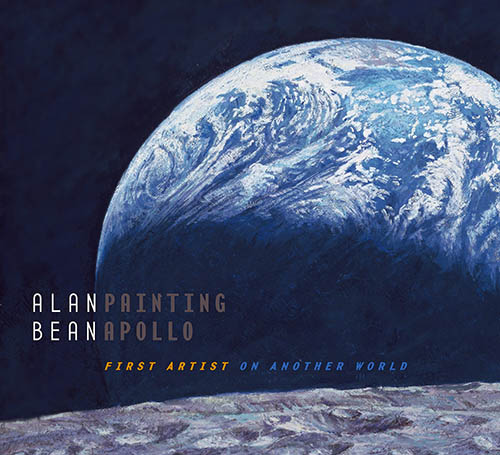
Painting Apollo: First Artist on Another World
Published: 2009
Publisher: Smithsonian Books
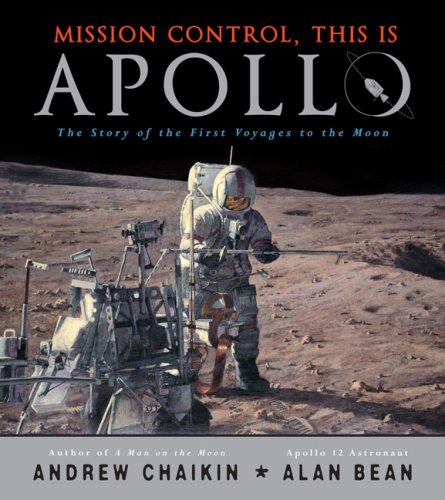
Mission Control, This is Apollo: The Story of the First Voyages to the Moon
by Andrew Chaikin (Author) and Alan Bean (Illustrator)
Published: 2009
Publisher: Viking Juvenile
“As the centuries unfold, millions of artists will live on the moon and paint the moon and Mars as we go out into the universe.”
Alan Bean: astronaut and space artist
